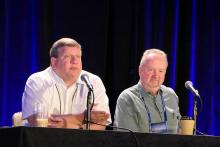MAUI, HAWAII – The interleukin-17A inhibitor secukinumab made a strong showing versus the tumor necrosis factor inhibitor adalimumab for the treatment of psoriatic arthritis in the 52-week, randomized, head-to-head phase 3b EXCEED study, Arthur Kavanaugh, MD, reported at the 2020 Rheumatology Winter Clinical Symposium.
EXCEED was the first double-blind, randomized comparison of an IL-17A inhibitor versus a tumor necrosis factor inhibitor as first-line biologic monotherapy in 853 psoriatic arthritis (PsA) patients with an inadequate response to conventional disease-modifying antirheumatic drugs. And while secukinumab (Cosentyx) narrowly failed to demonstrate superiority over adalimumab (Humira) on the primary endpoint of at least a 20% improvement over baseline on American College of Rheumatology disease criteria at 52 weeks, or ACR20 response, the IL-17A inhibitor demonstrated far greater efficacy for the skin disease, noted Dr. Kavanaugh, a rheumatologist who is professor of medicine at the University of California, San Diego, and RWCS program director. Patients received standard dosing of either drug: secukinumab at 300 mg every 4 weeks or adalimumab at 40 mg every 2 weeks.
Dr. Kavanaugh, an EXCEED coinvestigator, characterized the articular outcomes as similar in the two study arms. The ACR20 primary outcome rate was 67.4% in the secukinumab-treated patients and 61.5% with adalimumab, a difference that didn’t quite reach statistical significance (P = .07). However, in a prespecified secondary analysis of ACR20 rates based upon nonresponder imputation – the most conservative method of statistical analysis, in which all subjects who don’t complete the full study period are counted as treatment failures – secukinumab proved superior to adalimumab by a margin of 66.9% versus 59.5% (P = .02). That result was heavily influenced by the significantly higher dropout rate in the adalimumab group: 23.7%, compared with 14.2% in the secukinumab group.
The ACR50 response rate was 49% in the secukinumab group and 44.6% with adalimumab, a nonsignificant difference. Enthesitis resolution rates at 52 weeks were 60.5% and 54.2%, respectively, also a nonsignificant difference. The mean improvement in Health Assessment Questionnaire–Disability Index scores was closely similar in the two groups. However, a 90% improvement in Psoriasis Area and Severity Index scores, or PASI90 response, was achieved in 65.4% of the secukinumab group, far better than the 43.2% rate with adalimumab.
Dr. Kavanaugh observed that the EXCEED outcomes are consistent with the recently published 24-week results of the SPIRIT-H2H trial, an open-label, assessor-blinded randomized comparison of adalimumab versus another IL-17A inhibitor, ixekizumab (Taltz), in 566 PsA patients. Ixekizumab proved superior to adalimumab for the primary composite endpoint composed of an ACR50 response and simultaneous achievement of a PASI100 response, with rates of 36% and 28%, respectively. The ACR50 rates were similar for the two biologics, while the skin results were superior with ixekizumab.
Eric M. Ruderman, MD, said that, taken together, the EXCEED and SPIRIT-H2H results raise an important issue for clinical practice: Even though both secukinumab and ixekizumab are approved for the treatment of PsA, rheumatologists tend to reflexively reach for a TNF inhibitor as the first biologic in affected patients.
“I don’t know that that necessarily needs to be so. There’s absolutely no reason why an IL-17 inhibitor shouldn’t be equally an option as first-line treatment when you think about starting a biologic in these patients. It’s inertia: We like what we like, we do what we’ve been doing for a long time,” said Dr. Ruderman, professor of medicine and associate chief for clinical affairs in the division of rheumatology at Northwestern University, Chicago.
Indeed, an IL-17A inhibitor may actually be a better first-line option in certain circumstances, such as in the PsA patient with more extensive skin involvement, he continued. Also, there is a possibility that the IL-17A inhibitors are less immunogenic than the anti-TNF biologics, which may result in a more durable response. This concept, while still speculative, is supported by the recently published results of the long-term extension of the phase 3 FUTURE 1 study, in which 82% of patients randomized to secukinumab were still on the biologic after 5 years. That’s a far better retention rate than is seen with TNF inhibitors, he noted.
In addition, SPIRIT-H2H participants randomized to ixekizumab didn’t derive added benefit from concomitant methotrexate, while those on adalimumab did. Thus, PsA patients who desire a simpler, methotrexate-free regimen may prefer an IL-17A inhibitor, Dr. Ruderman said.
Dr. Kavanaugh noted that differences in the side effect profiles of the two classes of biologics may be relevant in treatment decisions. The TNF inhibitors have a higher risk of serious infections than do the IL-17A inhibitors, which in turn are associated with more Candida infections.
Dr. Kavanaugh reported receiving research funding from and serving as a consultant to Novartis, which sponsored EXCEED, as well as more than a dozen other pharmaceutical companies. Dr. Ruderman reported serving as a consultant to Pfizer.


